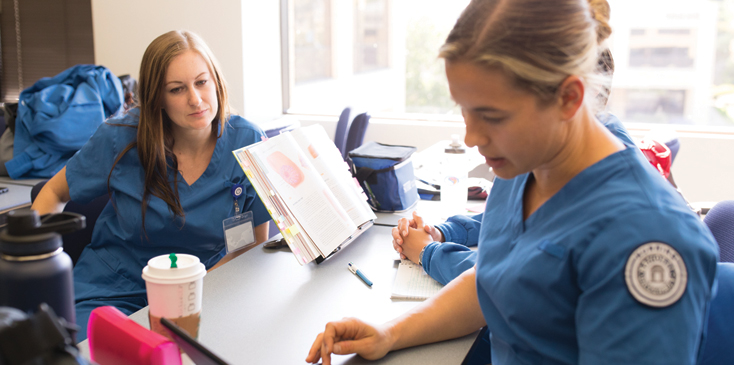
Information technology is everywhere — and the health care industry is no exception. As the amount of data collected in the medical field grows, the tools and strategies used to leverage this information are also increasing, translating numbers and statistics into positive outcomes for patients.
From diagnosing illnesses to billing insurance companies, nearly every component of the health care pipeline has been influenced by this modern use of data — which is more formally known as health informatics. In turn, this trend has had a significant impact on the daily roles and responsibilities of the professionals who work in this industry, including the nurses who interact directly with patients.
In order to provide the best possible care to their patients — and remain competitive in the job market — nurses need to stay up-to-date on the latest trends and developments in health informatics.
While health care professionals of all backgrounds can choose to pursue a graduate degree specifically in health informatics, many nurses who want to advance their career in this particular area of health care instead choose a route more aligned with their unique career path — the Master of Science in Nursing degree — and find a program that offers a specialization in nursing informatics.
MSN nursing informatics options provide nurses with the best of both worlds: the general nursing education they need to advance in a variety of roles while deepening their knowledge and skills in the areas of informatics theory and practice.
What is Health Informatics?

Health informatics is defined by the U.S. National Library of Medicine as “the interdisciplinary study of the design, development, adoption, and application of IT-based innovations in health care services delivery, management, and planning.” This technology is used to improve the efficacy and efficiency of a variety of areas of health care, including reducing costs, enhancing the ability to diagnose and treat patients, and improving overall outcomes.
Health informatics encompasses a wide range of tech applications in the field, with the number growing every day. Current examples of common applications include artificial intelligence, genomics, robotics, telehealth, microbiomics, apps, smart voice assistants, smart homes/remote monitoring, and wearables.
National University Professor, Linda Travis Macomber, RN, is the director of the Master of Science in Health Informatics program, where she works closely with nursing students who pursue an MSN with a Specialization in Nursing Informatics. When it comes to defining health informatics, she says that in addition to a more formal explanation, she likes to give students the following simple definition: “Where high tech meets human health.”
The study and practice of health informatics is about much more than simply learning to use the latest technology in patient care. While these health IT developments have the potential to do great good in health care, they also create challenges that professionals in the field must address. According to Dr. Barbara F. Piper, National University Professor of Nursing and the Academic Program Director of the MSN Core Curriculum, MSN in Nursing Administration, and MSN in Nursing Informatics, a key health informatics challenge is deciding where and how technology should touch human health.
“This requires true wisdom — not just data, statistics, and information,” Piper says. “As this new tech comes at us faster and faster each year, we need informatics grads to help us decide which are the right options to adopt. It is about finding ways to impact overall health in a positive way.”
Health Informatics in Nursing
As with many areas of the medical field, health informatics has had a great impact on the specific context of nursing practice. Nursing informatics is defined by HIMSS as “the specialty that integrates nursing science with multiple information management and analytical sciences to identify, define, manage, and communicate data, information, knowledge, and wisdom in nursing practice.” It involves using information processes, structures, and technology to support nurses, their patients, and other stakeholders in their decision making to improve outcomes in the health care setting.
Piper points to the Apple Watch as an example. With this piece of tech — and other similar wearable devices -— patients are able to track health information like pulse and blood pressure when they are home or otherwise away from a medical provider. This provides nurses with large amounts of data that can be used to monitor and even diagnose their patients from a distance.
“The Apple Watch shows us that we are moving from a system where you receive care at a physical location, to one where care is received anywhere and can even come to you,” Piper says. “We’re no longer limited to local resources and specific specialists that might be in our neighborhood. And care coordination is dramatically impacted because this information can now be accessed from anywhere through the use of electronic health records.”
From wearable devices to electronic health records, nurses are well-placed to both execute on and lead these efforts due to the amount of time they spend working directly with patients. However, many of these positions require a higher degree, which is why many nurses who are interested in taking on a leadership role in this area choose to enroll in an MSN nursing informatics program.
The MSN with a Specialization in Nursing Informatics
Since the Institute of Medicine released its report, “The Future of Nursing: Leading Change, Advancing Health,” which recommended that the number of nurses with a Bachelor of Science in Nursing degree or higher be increased to 80 percent by 2020, a growing number of students have successfully completed their BSN. While this degree was at one time viewed as a stepping stone for advanced responsibility, as the BSN becomes more common, the Master of Science in Nursing degree has increasingly taken its place as the option for nurses who want to take on leadership roles in their organization.
The general MSN is a graduate-level degree that typically takes about two years to complete, depending on your course load. Through online courses, classes at a physical campus, or a combination of the two, these programs will equip you with the advanced practice skills you need to assume leadership positions in your chosen specialization. This can include functioning as providers and organizers of the health care delivery process in a variety of capacities, including health IT.
In many programs, you have the option of pursuing a specialization or emphasis. Due to the rising use of technology and data in health care, nursing informatics is a popular choice.
The National University MSN with a Specialization in Nursing Informatics degree is designed to advance nurses’ knowledge and skills in informatics theory and practice. The program places a strong emphasis on Interprofessional Education, a practice which the World Health Organization defines as an innovative strategy which “occurs when students from two or more professions learn about, from, and with each other to enable effective collaboration and improve health outcomes.” In the instance of the National MSN nursing informatics program, you will benefit from completing your core nursing courses in the Master of Science in Nursing program, and your informatics classes in the Master of Science in Health Informatics program, gaining valuable insights from each program.
“By pursuing nursing informatics, our students get the best of both worlds at National,” says Piper. “They get the nursing component in the core curriculum and then the master’s program in health informatics, as a discipline.”
Through the program, you will gain the skills and confidence you need to:
- Plan, design, transition to and evaluate information systems and innovative technologies in collaboration with interprofessional teams.
- Put evidence-based practice resources and references into practice in order to support the adoption and use of point-of-care health care technologies.
- Appraise ongoing patient-centered care system quality and process improvement to optimize care coordination, clinical workflow, and patient outcomes.
- Ensure compliance with ethical, legal and regulatory mandates and professional standards for advanced practice through evaluation of the health care technology environment.
If you are already considering an MSN degree, adding the nursing informatics emphasis can provide the opportunity and skills to take on additional responsibilities and lead IT-related efforts in your workplace.
The Master of Science in Health Informatics Degree
While an MSN can be a great fit for your nursing informatics career aspirations, it is not the only option for an advanced degree that will expand your knowledge in this area. Some nurses instead opt for the Master of Science in Health Informatics degree.
At National, the MSHI degree encompasses the study of information systems, information technology, and informatics, including decision support, care coordination, consumer empowerment, the structured language of health care, standards, health information exchange, usability, electronic health records, security, socio-technical aspects of health computing, human-computer interaction, evidenced-based practice, and health outcomes.
The program’s learning outcomes include:
- Evaluating standards, technologies, and methods used in health data management to improve the organization’s quality, efficiency, equity, and safety.
- Creating policies and technologies to protect the integrity and validity of data.
- Using information systems and technologies to develop strategies aimed at enhancing health care delivery and reaching institutional strategic initiatives.
- Assessing the processes and systems of a health care organization to ensure legal, ethical, and regulatory compliance.
- Apply research and statistical methodologies to initiate the practice of evidence-based health information technology management and drive improvements to health care quality.
These skills can equip you to work in a hospital or other clinical setting as a manager or director of clinical informatics or take on a position at one of the growing numbers of digital health startups.
With an MSHI and appropriate work experience, you can even rise through the ranks in your organization to earn a position in the C-suite as a chief information officer. In this role, “I work closely with informatics students to make sure they have the right projects, electives, and experiential learning to get where they want to be in their career,” Macomber says. “It’s not just about learning content, it’s about learning what about informatics that fits you best and building on your greatest interest area and skillset.”
In the MSHI program, you will learn alongside a diverse range of professionals, as opposed to the MSN nursing informatics degree, which is only appropriate for students who are already working as registered nurses.
“The students in the MSHI program come from diverse backgrounds,” Macomber says. “This program has had students who are nurses, pharmacists, and lab techs, as well as people with backgrounds in business, information systems, library science, health administration, technology, and even liberal arts.”
Informatics Certification
Regardless of the degree you choose to pursue, leadership roles specifically in informatics often require certification. There are multiple options available, but one popular choice for nurses is the ANCC Informatics Nursing board certification.
This competency-based examination assesses your entry-level clinical skills and knowledge in informatics after you receive RN licensure. By passing the exam, you earn the Registered Nurse-Board Certified (RN-BC) credential, which is valid for five years.
While a master’s degree is not required for informatics certification, many students choose to earn a higher degree in order to deepen their understanding of the practice of nursing informatics and to stand apart from the crowd when applying for positions in the field.
“The courses in our MSN nursing informatics program will help students who want to pursue certification in that area,” Piper says. “The Health Information Management System Society also offers certification options, and the program is designed to help prepare a student to sit for those more general informatics credentials as well if they choose that direction.”
Careers With MSN Nursing Informatics Emphasis
After completing an MSN nursing informatics program and earning your credential, you will be well on your way to pursuing an exciting role in health informatics. While there are many options, the most common nursing-specific job title is that of nurse informatics specialist, which is sometimes alternatively known as an informatics nurse specialist.
As a nurse informatics specialist, you are responsible for areas where informatics touches patient care. This may include leading or being involved with regulatory and quality initiatives and research, system development, and staff training. You may also be asked to act as a liaison between the technical and clinical teams in your organization.

If you continue in this area of practice, you may be able to work up to the terminal role — chief nursing informatics officer. Though the exact responsibilities vary by workplace, the Healthcare Information and Management Systems Society reports that CNIOs are usually involved in leading strategy involving quality, patient safety, policy and procedure, and technology.
HIMSS reports that an MSN or master’s degree in informatics is typically required, but a Doctor of Nursing Practice or Doctor of Philosophy in Nursing/Informatics is sometimes preferred in some workplaces.
“We see a lot of career diversity in our National graduates,” Piper says. “A growing number are becoming chief nursing informatics officers in hospitals and clinics. Others are entering acute care roles in outpatient clinics, physician offices, and nurse-managed clinics.”
Is an MSN With Health Informatics Emphasis Right for You?
Are you considering pursuing an MSN nursing informatics degree? Start by giving some thought to your career goals. According to Macomber, it is important to discover your mission before enrolling in a program. If you are passionate, not only about new and exciting technology but about the way it can be used to impact patient care, nursing informatics could be the right career for you.
“For me, informatics is about using relevant and exciting technology applications that add years to patients’ lives and life to their years,” Macomber says. “It is not just about theory, technologies, or the data alone.”
Keep in mind that the study and practice of nursing informatics — and health informatics in general — is still developing and evolving. If you enjoy the idea of helping to shape a new area of the health care field, a role in informatics provides a great opportunity.
“The right informatics answers and words tomorrow will be different than those of today,” Macomber says. “Grads with informatics degrees can literally help to create these new definitions and define the field as it grows.”
Your Informatics Degree at National University
When it comes to earning a nursing informatics degree, California-based National University could be the right fit.” The National MSN with specialization in Nursing Informatics is accredited by the commission on collegiate nursing education. Through relevant, experiential learning opportunities with the health IT simulation and resource lab, along with a blending of a high tech and human-focused educational experience and a timely start and graduation, you will gain the tools you need to sharpen your nursing skills while gaining cutting-edge strategies and frameworks in informatics. And through our exemplary faculty, you will receive the support you need to succeed, not only in our program but after graduation as well.
“Nursing informatics is changing and growing. It’s ever dynamic,” Macomber says. “You need vision and passion to excel in this field, but you also need to be well prepared for these challenges. National students graduate ready to contribute.”
Want to learn more about how you can pursue a Master of Science in Nursing with a specialization in nursing informatics through National University? Request information online on our program page.